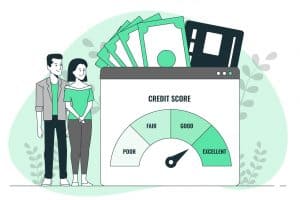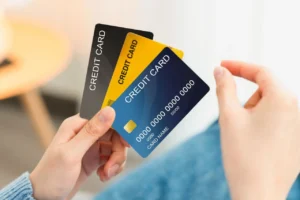Holidays often bring joy and celebration, but it’s important to stay financially vigilant during these times, as the festive seasons can increase credit card defaults.
The Monetary Authority of Singapore (MAS) has issued a gentle reminder, emphasizing the need for responsible credit card usage. They state, “With the increase in interest rates and late payment fees, credit card holders in Singapore should ensure that outstanding bills are paid in full and on time to avoid incurring additional charges and defaulting.”
With that in mind, essential knowledge and strategies to maintain financial stability and avoid the pitfalls of credit card debt. You can enjoy the festive seasons without compromising your financial health by staying informed and cautious.
What is a Credit Card Default
Credit card default occurs when you fail to meet your minimum amount due (MAD) for an extended period, typically exceeding 180 days. This breach triggers a series of consequences, including increased interest rates, penalty fees, and damaging your credit score.
Common Reasons Leading to Credit Card Default
Several common reasons can lead you down the path of credit card default. They include:
- Financial Hardships: Unexpected job loss, medical emergencies, or other unforeseen financial crises can severely strain your ability to meet credit card obligations.
- Excessive Debt: Accumulating high levels of debt across multiple credit cards can overwhelm a person’s financial capacity, making it challenging to make timely payments.
- Poor Financial Planning: Lack of budgeting and financial planning often results in overspending, leaving individuals unable to responsibly manage their credit card balances.
- Interest Rate Increases: When your credit card issuer raises interest rates, it can significantly escalate the cost of carrying a balance, making it challenging to keep up with your credit card bill.
- Minimum Payment Trap: Relying solely on minimum payments may seem manageable initially, but the compounding interest over time can lead to an unmanageable debt load.
Immediate Consequences of Default
Credit card default affects your financial well-being significantly. Some of the immediate consequences include:
- Increased Interest Rates and Penalties: The credit card default triggers heightened interest rates and penalty fees. Lenders often impose punitive measures, compounding the debt and making catching up on your credit card bill more challenging.
- Impact on Credit Score: Defaulting has a severe impact on credit scores. This affects your future borrowing capacity and impacts your non-financial aspects like housing or job opportunities.
- Communication from Creditors: Creditors become more proactive in seeking repayment. Therefore, you should expect increased communication through collection calls, emails, and letters urging immediate action to settle outstanding credit card bills. This can add emotional stress to the already challenging financial situation.
Long-Term Implications
Defaulting on your credit card has lasting consequences beyond immediate challenges. Some of these implications include:
- Prolonged Damage to Your Credit History: When you default, it leaves a lasting mark on your credit history. This negative entry can persist for several years, impacting your creditworthiness. This, in turn, can make it difficult to secure favorable interest rates on future loans, such as when you’re looking to finance a home or a car.
- Legal Repercussions and Debt Collection: A persistent credit card defaulter may prompt a credit card company to take legal action to recover the outstanding debt by contacting a debt collection agency. This could result in court judgments, wage garnishments, or even liens on your assets. These legal repercussions can significantly intensify the financial strain you’re already experiencing.
- Difficulty Securing Future Credit or Loans: Obtaining new credit or loans becomes challenging once you default. Lenders see individuals with a history of default as high-risk borrowers. Securing favorable terms or getting approval for future financial products is tough. For instance, if you default on a credit card, getting approved for a mortgage or a personal loan down the line becomes a considerable challenge.
Emotional and Psychological Effects
Experiencing credit card default can take a toll on you emotionally and psychologically, manifesting in various ways.
Stress and Anxiety Associated with Debt
Defaulting on your credit card often results in stress and anxiety. The constant worry about outstanding payments, interest rates, and potential legal consequences can lead to sleepless nights and increased emotional strain.
It’s not just about the financial burden but also the emotional weight of navigating a challenging situation.
Social Implications and Stigma
Credit card defaults may result in social implications and a sense of stigma. You might be reluctant to discuss financial difficulties with friends and family due to the fear of judgment.
Also, the societal pressure to maintain a certain financial image can intensify feelings of shame and isolation. That’s why recognizing that financial difficulties are a common part of life and seeking support is crucial for effectively managing both the emotional and financial aspects.
Note: You should seek professional advice and establish a support system to empower you to navigate these challenges and work toward financial and emotional well-being.
Preventive Measures
Preventing credit card default involves implementing proactive measures to manage your finances effectively. Here are some of the strategies you should consider to avoid defaulting:
- Setting Payment Reminders: Establishing payment reminders can help you stay on top of due dates. Use mobile apps, calendar alerts, or automated reminders from your bank to ensure timely payments. This simple step can significantly reduce the risk of overlooking payment obligations.
- Budgeting: Create a comprehensive budget that outlines your income, expenses, and debt obligations. Allocate funds for credit card payments within your budget, prioritizing them alongside essential expenses. This ensures that you clearly understand your financial commitments and can allocate resources accordingly.
- Emergency Fund: Build an emergency fund to buffer against unforeseen financial challenges. Having savings set aside can provide a financial cushion, preventing the need to rely solely on credit cards during unexpected circumstances.
- Regular Financial Check-ins: Schedule regular reviews of your financial situation. This includes tracking spending patterns, assessing debt levels, and evaluating your financial health. Regular check-ins empower you to make informed decisions and address potential issues before they escalate.
- Credit Counseling: Seek advice from credit counseling services if you anticipate financial difficulties. Professionals can provide tailored guidance, helping you restructure your finances and develop a manageable repayment plan.

Importance of Timely Minimum Payments
Timely minimum payments on credit cards hold significant importance for the following reasons:
- Credit Score Maintenance: Making timely minimum payments improves your credit score. This is because your payment history is crucial in determining your creditworthiness. Consistent on-time payments demonstrate financial responsibility, enhancing your credit profile and making qualifying for future loans or credit easier.
- Avoidance of Late Fees and Penalties: Timely payments help you avoid late fees and penalties imposed by credit card issuers. Missing payment deadlines can result in additional charges, increasing the overall cost of your outstanding balance.
- Interest Rate Management: Meeting minimum payment requirements prevents your account from entering default status, which could trigger higher interest rates. By making timely payments, you maintain control over interest accrual, saving money in the long run.
- Preservation of Credit Card Benefits: Timely payments ensure that you continue to enjoy the benefits associated with your credit card, such as reward programs, cashback incentives, or promotional offers. Defaulting may lead to the suspension or termination of these perks.
- Prevention of Negative Credit Reporting: Consistent on-time payments prevent negative entries on your credit report. Late payments and defaults can remain on your credit history for years, impacting your ability to secure favorable interest rates on loans or obtain new lines of credit.
Managing a Default Situation
Managing a credit card default situation requires a strategic and proactive approach. Here are the steps to take after defaulting:
Step 1: Assess the Situation
Begin by assessing the extent of the credit card default. Review your outstanding balance, interest rates, and any additional fees incurred. This is essential because understanding the full scope of the default allows you to develop a comprehensive plan.
Step 2: Contact the Credit Card Issuer
Reach out to your credit card issuer as soon as possible. Inform them about your current financial situation, the reasons behind the default, and your commitment to resolving it. Some credit card issuers may be willing to work with you to establish a repayment plan or explore other solutions.
Step 3: Negotiate a Repayment Plan
Work with your credit card issuer to negotiate a feasible repayment plan. This could involve restructuring your debt, setting up a realistic payment schedule, or negotiating a lower interest rate.
Step 4: Seek Professional Financial Advice
Consider seeking advice from professionals such as financial advisors. This is because economic experts can provide guidance on debt management, budgeting, and negotiating with creditors. They may also help you develop a plan to regain control of your financial situation, such as debt consolidation.
Leslie Tayne, a financial attorney and credit & debt expert, advises people to plan ahead, saying, “Start to think about what you spend. Take a look at your credit cards. If you continue to just make minimum payments, that’s not going to get you out of debt any time soon.”
FAQs
1. What happens when your credit card goes into default?
When your credit card defaults, it triggers a series of consequences, such as increased interest rates, penalty fees, and a negative impact on your credit score. Lenders may also take legal action to recover the outstanding debt.
2. What happens if I have a default on my credit?
If you default on your credit, you may experience difficulty securing new credit or loans, face higher interest rates, and encounter challenges in obtaining favorable terms for financial products.
3. What happens if I never pay my credit card?
If you never pay your credit card, the situation can escalate. You may face legal action from creditors, resulting in judgments, wage garnishments, or liens on your assets. Additionally, the default remains on your credit report for an extended period, impacting your financial reputation.
4. How long does a credit card default last?
The duration of a credit card default on your credit report can vary. Typically, it stays on your report for up to seven years. However, its impact on your credit score lessens over time, especially if you take steps to rebuild your credit through responsible financial practices.
Closing
Understanding the nuances of credit card default is paramount in safeguarding your financial stability. Mitigate potential pitfalls by staying informed about repayment strategies, interest rates, and proactive financial planning. Armed with this knowledge, you can confidently navigate the credit landscape, making strategic decisions to fortify your economic well-being. Remember, a well-informed approach is your best defense against the challenges associated with credit card default.
Key Takeaways
- Credit card default triggers increased interest rates and penalties and negatively impacts your credit score.
- Timely and transparent discussions with creditors are crucial in managing a credit card default situation.
- Setting payment reminders, budgeting effectively, and building an emergency fund are essential strategies to prevent credit card default and maintain financial stability.
Are you in Singapore and need immediate cash for an emergency or personal purpose? Instant Loan provides you with the best personal loan offers with manageable repayments from three of Singapore’s best money lenders free of charge. Fill out our quick form today to get started.








